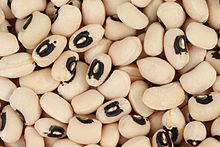ẹwa
Appearance
Yoruba
[edit]Etymology 1
[edit]| 100 | ||||
| [a], [b] ← 1 | ← 9 | 10 | 11 → | 20 → |
|---|---|---|---|---|
| 1[a], [b] | ||||
| Cardinal: ẹ̀wá Counting: ẹẹ́wàá Adjectival: mẹ́wàá Ordinal: kẹwàá Adverbial: ẹ̀ẹ̀mẹwàá Distributive: mẹ́wàá mẹ́wàá Collective: mẹ́wẹ̀ẹ̀wàá Fractional: ìdámẹ́wàá | ||||
Proposed to have derived from Proto-Yoruboid *ɛ̀-gwá. Cognates include Igala ẹ̀gwá and Itsekiri mẹ̀gwá
Pronunciation
[edit]Numeral
[edit]ẹ̀wá
Etymology 2
[edit]Proposed to have derived from Proto-Yoruboid *ɛ̀-gwà. Possible cognates include Igala ẹ̀gwà and Igbo àgwà.



Pronunciation
[edit]Noun
[edit]ẹ̀wà
- The bean plant, usually referring to several members of the family Fabaceae and often specifically the cowpea plant
- Synonyms: ẹ̀wà dúdú, ẹ̀wà-ẹrẹwẹ, ẹ̀wà-funfun, erèé
- A general name for beans, peas, and legumes, often specifically referring to the black-eyed pea
- cooked beans
Derived terms
[edit]- ẹlẹ́wà
- ẹ̀wà dídì
- ẹ̀wà sèsé (“lima bean, pigeon pea”)
- ẹ̀wà òkòdó (“Cyperus alternifolius”)
- ẹ̀wà òrìṣà
- ẹ̀wà-ahun (“Centrosema pubescens”)
Related terms
[edit]- ẹwẹ (“a type of species of beans”)
Etymology 3
[edit]From ẹ- + wà, perhaps related to ìwà
Pronunciation
[edit]Noun
[edit]ẹwà
